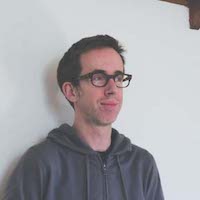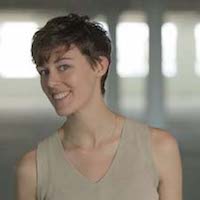Establishing A New Masters of Public Action Program

Bennington announces a new graduate program that bridges public action and art
This past fall, Bennington established a new, two-year Master of Fine Arts in Public Action degree program. Directed by faculty member Robert Ransick in collaboration with Director for the Center for the Advancement of Public Action Susan Sgorbati, the program accepts two to three artists with significant professional accomplishments. The candidates work closely with faculty mentors and teach select undergraduate courses—a structure established with success by the College’s Master of Fine Arts in Dance program.
Artists and community activists Aaron Landsman and Caroline Woolard were the first candidates accepted to the program. Both are based in New York City, where they have developed creative work focusing on building community coalitions and pieces that address gentrification and affordable housing.
For Landsman that takes the form of a 20-year art and activism project titled Perfect City. He explains, “The project centers around a paid working group of young adults on the Lower East Side and our research and production on gentrification.” The group’s work spans many mediums, from publishing articles to hosting avoidance mapping workshops, to roundtable performances and research that deals with the rhetoric of street harassment. Together, he said, “We are evolving collective leadership and business models.” While at Bennington, Landsman will continue this two decade-long project and will be working with advisor Sherry Kramer on a book titled No One Is Qualified— which stems from his participatory performance City Council Meeting—and will build an educational curriculum for secondary and college students about participation, democracy, and empathy.
Also based in New York City, Caroline Woolard’s most recent work has focused on crafting sustainable and stable conditions for artists to develop work and roots in New York. This exploration began early in her career, Woolard explains in an Art21 feature. “In art school I would always be the one to ask the questions that no one wanted to ask: how do you survive as an artist living in NYC?”
What seems like a pragmatic question became a generative exploration that blossomed into this visual artist’s most recent project: the New York City Real Estate Investment Cooperative. Recognizing the need for affordable, cost-stable commercial space, Woolard organized a coalition of experts and artists to address the need by, as she puts it, “fighting money with money.” Together the group has raised more than $1.5 million in invested pledges in an effort to make New York City a model for affordable commercial space.
For Woolard this is as much a cause as a canvas. “I’m an art school graduate who rejects the notion of constant movement,” she says. “Truly transformative work takes so much more time than a month-long show…to change yourself in the city, you have to commit to that city and find others who are committed as well.”
In addition to the New York City Real Estate Investment Cooperative, Woolard’s widely acclaimed and commissioned work includes sculptures that use online networks, hand-built objects, and immersive environments. While at Bennington, Woolard will continue this work by creating sculptural objects that honor practices of facilitation and conflict transformation in self-organized groups. These objects will be housed in facilitation object libraries at Moore College of Art and Design, where Woolard is the inaugural Walentas Fellow and at the Crossett Library.
During their study at Bennington, Landsman and Woolard will explore topics such as community regeneration, civic participation, economic development, creative placemaking, public policy, environmental advocacy, and conflict resolution, among other areas where there is an urgent need for creative approaches to systemic challenges.
“We are excited to offer this new MFA in Public Action, which combines artistry and social justice into a uniquely rigorous graduate degree,” said Provost and Dean of the College Isabel Roche. “We are confident that our inaugural candidates will find their time at the College beneficial, as they teach current undergraduates, develop their own socially engaged work, study alongside faculty mentors, and ultimately find themselves challenged, and their skills deepened, from their participation.”
Reflecting the curricular pedagogy of the undergraduate program, courses of study will be largely self-directed by the candidates working closely with faculty mentors. The schedule for each term will primarily incorporate research and work in creative public action. Each candidate will meet for the Graduate Research Seminar in Public Action course, a weekly tutorial with faculty members to discuss and show the development of new material that will be at the foundation of their individual study.
“The MFA in Public Action is a unique program that supports highly accomplished artists in the further development of their creative work tackling systemic challenges facing our world at Bennington’s Center for the Advancement of Public Action,” Ransick explained.
Meet the Candidates
 Aaron Landsman makes live performances and other events, which exist at the intersection of art and community organizing. His work includes site-specific productions in the kinds of places where people perform their lives: homes, offices, buses, and meeting rooms, as well as more traditionally staged works. His recent projects have been presented in New York at Abrons Art Center, The Chocolate Factory Theater, and HERE Art Center. From 2012–14 his participatory theatre work, City Council Meeting, created with Mallory Catlett and Jim Findlay, was presented in Houston, Tempe, New York, San Francisco, and Keene, NH. He is currently in year two of a 20-year art and activism project about gentrification called Perfect City, making a new theatrical work about oligarchy and translation with collaborators in Serbia, Nigeria, and Brazil called Language Reversal, about translation and oligarchy, and developing a new piece called Night Keeper, which takes place mostly in the dark. Landsman is a 2017–18 Guggenheim Fellow in Theater, a former Arts Fellow, and current visiting associate professor at Princeton. His work has been funded by NPN, NEFA’s National Theater Project, MAP, and Jerome, among others. He co-created and teaches the Creative Capital Professional Development Program’s core weekend and daylong workshops. Landsman performed for many years with the award-winning ensemble Elevator Repair Service Theater and has appeared in the work of many choreographers, composers, and directors.
Aaron Landsman makes live performances and other events, which exist at the intersection of art and community organizing. His work includes site-specific productions in the kinds of places where people perform their lives: homes, offices, buses, and meeting rooms, as well as more traditionally staged works. His recent projects have been presented in New York at Abrons Art Center, The Chocolate Factory Theater, and HERE Art Center. From 2012–14 his participatory theatre work, City Council Meeting, created with Mallory Catlett and Jim Findlay, was presented in Houston, Tempe, New York, San Francisco, and Keene, NH. He is currently in year two of a 20-year art and activism project about gentrification called Perfect City, making a new theatrical work about oligarchy and translation with collaborators in Serbia, Nigeria, and Brazil called Language Reversal, about translation and oligarchy, and developing a new piece called Night Keeper, which takes place mostly in the dark. Landsman is a 2017–18 Guggenheim Fellow in Theater, a former Arts Fellow, and current visiting associate professor at Princeton. His work has been funded by NPN, NEFA’s National Theater Project, MAP, and Jerome, among others. He co-created and teaches the Creative Capital Professional Development Program’s core weekend and daylong workshops. Landsman performed for many years with the award-winning ensemble Elevator Repair Service Theater and has appeared in the work of many choreographers, composers, and directors.
 Caroline Woolard is a New York–based artist born in Rhode Island. Woolard creates sculptures using online networks, hand-built objects, and immersive environments. Her work has been commissioned by MoMA, the Whitney Museum of American Art, the Metropolitan Museum of Art, Creative Time, the Brooklyn Museum, Cornell University, and Cooper Union. Woolard’s work has been celebrated by the National Endowment for the Arts, where she delivered the 50th Anniversary keynote (2017) and in New York Close Up, the PBS / Art21 documentary series (2017). Solo exhibitions include Imperial Forms, LMAK gallery, New York, NY (2018) and Carried on Both Sides, Lesley Heller Workspace, New York, NY (2018). Group exhibitions include Crossing Brooklyn, Brooklyn Museum, Brooklyn, NY (2014) and Living as Form, Creative Time, New York, NY (2011).
Caroline Woolard is a New York–based artist born in Rhode Island. Woolard creates sculptures using online networks, hand-built objects, and immersive environments. Her work has been commissioned by MoMA, the Whitney Museum of American Art, the Metropolitan Museum of Art, Creative Time, the Brooklyn Museum, Cornell University, and Cooper Union. Woolard’s work has been celebrated by the National Endowment for the Arts, where she delivered the 50th Anniversary keynote (2017) and in New York Close Up, the PBS / Art21 documentary series (2017). Solo exhibitions include Imperial Forms, LMAK gallery, New York, NY (2018) and Carried on Both Sides, Lesley Heller Workspace, New York, NY (2018). Group exhibitions include Crossing Brooklyn, Brooklyn Museum, Brooklyn, NY (2014) and Living as Form, Creative Time, New York, NY (2011).
Woolard’s work has been supported by residencies at NEWINC, New York, NY (2017); Lower Manhattan Cultural Council (LMCC) Workspace, New York, NY (2016); MoMA, New York, NY (2014); Queens Museum, Queens, NY, (2014); and Watermill, Water Mill, NY (2011) and through fellowships at Eyebeam, Brooklyn, NY (2013) and the MacDowell Colony, Peterborough, NH (2009). Woolard is an assistant professor of sculpture at the University of Hartford and a mentor in MFA Fine Arts at the School of Visual Arts. Recent scholarly writing on her work has been published in The Brooklyn Rail (2018); Artforum (2016); Art in America (2016); The New York Times (2016); and South Atlantic Quarterly (2015). Woolard’s work has been featured twice in PBS / Art21 for New York Close Up (2014, 2016). She holds a BFA from Cooper Union (sculpture, 2007) and is a recipient of the Rockefeller Cultural Innovation Fund (OurGoods, 2010–12), the Antipode Scholar-Activist Project Award (Community Economies Collective, 2016), and the Theo Westenberger Estate Fund (2015). Woolard has been named one of 11 Artists to Transform the Art World (2017), has been listed in the WIRED Smart List (2013), ArtNet's Top 20 Female Artists (2015), and in the Top 100 Women for the Commons by the Peer to Peer Foundation (2014).